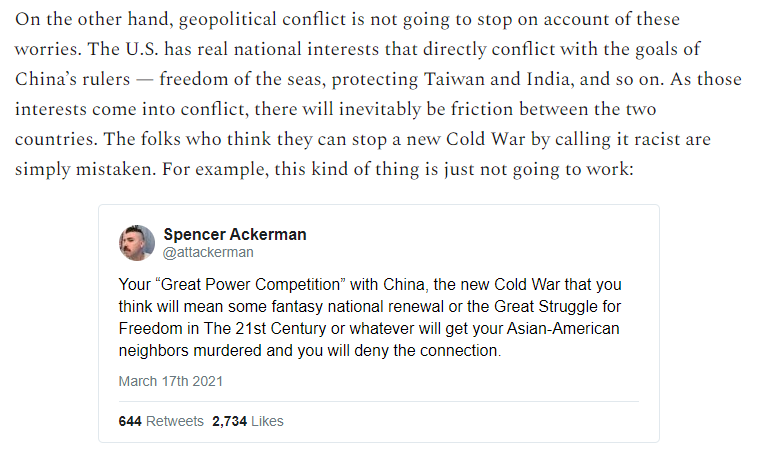1/Here's a post about a difficult and sensitive topic: How to criticize China without exacerbating anti-Asian racism.
noahpinion.substack.com/p/how-to-criti…
noahpinion.substack.com/p/how-to-criti…
2/Some of the people who say that criticism of China = racism are just trolls...Cold Warriors who are on the anti-American side and want an excuse to defend a rival of America.
But for many, the worry is real and legitimate.
But for many, the worry is real and legitimate.

3/There is no denying that there's a wave of racist hate against Asian Americans right now. And there's no denying that attitudes toward China (esp. about coronavirus) have something to do with it.
This is really, really bad.
noahpinion.substack.com/p/is-conflict-…
This is really, really bad.
noahpinion.substack.com/p/is-conflict-…
4/But it's also true that U.S.-China tensions can't be banished just by some lefties yelling that criticism of China is racist. 

5/If Cold War 2 is going to happen, then it's going to happen. China has a lot of agency here; it's not just Mike Pompeo deciding to stir the pot, or whatever. China is in the driver's seat.
So we need to accept this fact, and roll with it.
So we need to accept this fact, and roll with it.

6/@mattyglesias is right when he says that criticism of China is not racist by nature.
We can and should criticize governments without criticizing whole groups of people.
slowboring.com/p/china-racist
We can and should criticize governments without criticizing whole groups of people.
slowboring.com/p/china-racist
7/But that's a MORAL argument. In PRACTICAL terms, the threat of anti-Asian racism is real, and we need to take steps to minimize it. So here are some steps we can take...
8/First, we need to remember that RHETORIC MATTERS.
Here was what George W. Bush said about Muslims, directly after the 9/11 attacks.

Here was what George W. Bush said about Muslims, directly after the 9/11 attacks.


9/And although there was a burst of anti-Muslim violence right after the attacks, it quickly (mostly) subsided. In fact, the big wave of anti-Muslim attacks came not in 2001-2002, but in 2015-2016! 

10/In the five years after 9/11 there were two deadly attacks on Muslims (or perceived Muslims) in America.
In 2014-17, there were EIGHT such attacks.
In 2014-17, there were EIGHT such attacks.

12/RHETORIC MATTERS, and Republicans need to start explicitly denouncing violence against Asians, loudly and repeatedly.
13/What can the rest of us do?
One thing we can do is to focus on our Asian allies and on Chinese dissidents.
The people actually under threat from Xi Jinping's government are not White people in America, but ASIAN PEOPLE, IN ASIA.
One thing we can do is to focus on our Asian allies and on Chinese dissidents.
The people actually under threat from Xi Jinping's government are not White people in America, but ASIAN PEOPLE, IN ASIA.

14/China's neighbors are under threat. China's minorities are under threat. China's dissidents are under threat. 

15/Centering these people will remind Americans that U.S.-China tensions are not a "clash of civilizations", but a clash of governments and values. 

16/And finally, the most important thing we can do to sever the link between U.S.-China tensions and anti-Asian racism is ASIAN REPRESENTATION.
We need to write a story of America in which Asian Americans play a more central role.
We need to write a story of America in which Asian Americans play a more central role.
17/In fact, we actually tried to do this in World War 2.
Here is an excerpt from @ellendwu's "The Color of Success" -- a book you should definitely read.
amazon.com/Color-Success-…

Here is an excerpt from @ellendwu's "The Color of Success" -- a book you should definitely read.
amazon.com/Color-Success-…


18/Of course, modern efforts to center Asian Americans in our national culture will not look like the dated, clumsy programs of WW2.
But that's OK.
But that's OK.

19/And this isn't just practicality. Centering Asian Americans is important to our cause.
Because one of America’s core values must be that we accept and include everybody. Otherwise, what the hell do we even stand for in the first place?
Because one of America’s core values must be that we accept and include everybody. Otherwise, what the hell do we even stand for in the first place?
20/Anyway, I realize that this program will not entirely eliminate the risk that U.S.-China tensions will exacerbate anti-Asian racism.
But it would go a long way toward reducing that risk. It is morally incumbent upon us to do everything we can.
(end)
noahpinion.substack.com/p/how-to-criti…
But it would go a long way toward reducing that risk. It is morally incumbent upon us to do everything we can.
(end)
noahpinion.substack.com/p/how-to-criti…
• • •
Missing some Tweet in this thread? You can try to
force a refresh










